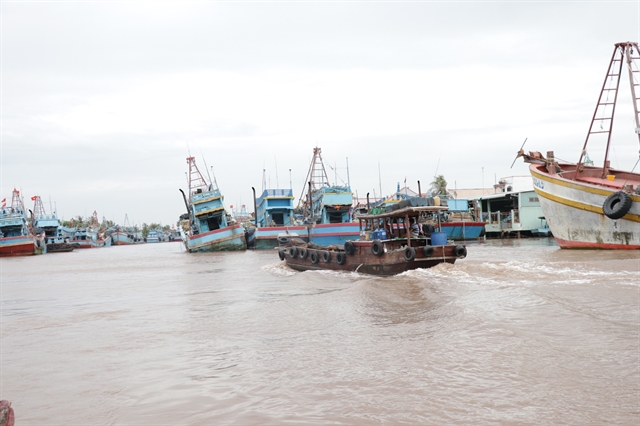 Society
Society


|
| Fishing boats dock at Bình Thắng fishing port in Bến Tre Province’s Bình Đại District. VNA/VNS Photo Huỳnh Phúc Hậu |
BẾN TRE — The Mekong Delta province of Bến Tre will develop its maritime economy over the next decade, focusing on fishing, tourism and renewable energy, according to its People’s Committee.
A plan it has drafted for the purpose envisages, by 2030, the maritime economy accounting for 30 per cent of the overall provincial economy.
It will focus on aquaculture models that use advanced techniques and are biologically safe and environment-friendly.
It plans to increase the area under aquaculture to 42,000ha and annual output to 136,000 tonnes. Around 5,100ha will be farmed using advanced techniques.
All intensive farming areas raising key aquatic species will meet Vietnamese good agricultural practices (VietGAP) or other standards such as GlobalGAP and Aquaculture Stewardship Council (ASC).
The province targets annual revenues of VNĐ450 million (US$19,400) per hectare from aquaculture by 2030.
It plans to set up five or six new seafood processing plants, including two to three for shrimp. It will develop a marine economic industrial park in Thạnh Phú District before the end of the plan.
The province targets construction of one renewable power plant this year and linking it with the national grid.
Its production of wind power will reach 1,285MW and solar power, more than 200MW by 2030.
It will develop marine tourism together with agricultural services in the three coastal districts of Bình Đại, Ba Tri and Thạnh Phú districts.
It plans to increase tourism revenues three fold by 2030.
Cao Văn Trọng, chairman of the province People’s Committee, said to achieve the targets more investments would be made in infrastructure to develop aquaculture areas that use advanced techniques in the three coastal districts.
Models that help adapt to climate change would be expanded, he said.
The focus would be on the use of advance techniques in aquaculture, fishing and processing and preservation of seafood that have high value and demand, he said.
The province has 11 seafood processing plants with an annual output of 72,000 tonnes, mostly frozen tra fish, clam and shrimp.
The area under aquaculture in the province has increased rapidly in recent years, with the key items being marine shrimp, tra fish and clam.
More and more farmers and companies in the province are adopting good agricultural practice standards such as GlobalGAP and ASC standards for exports.
The province had nearly 22,000ha under black-tiger shrimp in the first quarter of this year, according to its Department of Agriculture and Rural Development.
Fishermen’s catches totalled 48,569 tonnes in the first quarter, a 5.25 per cent increase year-on-year.
The department attributed the increase to the upgrading of fishing boats used for offshore fishing.
The province has focused on developing offshore fishing activities, advanced fishing methods and logistic services for fishing boats at sea.
The People’s Committee has ordered the Department of Industry and Trade and other relevant agencies to enable investors to quickly build the wind and solar power projects that have been licensed.
With a coastline of 65km, Bến Tre has great potential in renewable energy, marine tourism, aquaculture, and fisheries. — VNS




